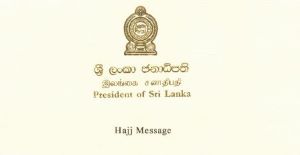The Ministry of Foreign Affairs unreservedly rejects the reference to a Tamil Genocide Remembrance Day in the statement issued on 23 July 2023 by the Canadian Prime Minister Justin Trudeau.
Canada's continued reference to a false, distorted narrative of the past conflict in Sri Lanka is aimed solely at achieving local vote-bank electoral gains, and is not conducive to broader goals of communal harmony.
Sri Lanka urges Canada and its leaders to support Sri Lanka in its efforts to ensure stability, progress, peace and reconciliation among all communities in all parts of Sri Lanka, as well as among communities of Sri Lankan heritage overseas.
Ministry of Foreign Affairs
Colombo
25 July 2023
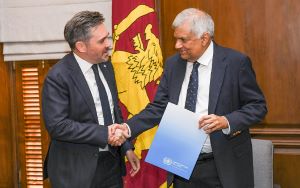
The United Nations Resident Coordinator, Marc-André Franche, paid a courtesy call to President Ranil Wickremesinghe yesterday afternoon (24).
During the meeting, Marc-André Franche, the UN Resident Coordinator, engaged in constructive dialogue with President Wickremesinghe on matters of utmost importance for Sri Lanka's economic stability and growth. Both parties acknowledged the significance of the role the UN could play in assisting Sri Lanka in ensuring equitable debt treatment as Sri Lanka undergoes a restructuring process to overcome financial challenges and foster sustainable development.
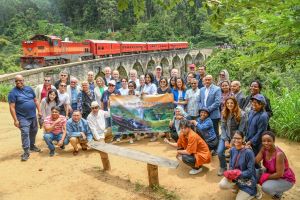
The Ministry of Foreign Affairs in collaboration with the Presidential Secretariat and the Sri Lanka Tourism Promotion Bureau organized the Ella Odyssey, a familiarization tour of Nuwara Eliya and Ella for foreign heads of mission in Colombo, and nine heads of mission based in New Delhi who presented credentials to President Ranil Wickremesinghe.
Ella Odyssey is part of Sri Lanka’s commemoration of 75 years of independence and 75 years of diplomacy – testament to the country’s enduring engagement with the international community.
This journey to the mesmerizing ‘tea country’ in the mountains of Sri Lanka took place from 1 - 3 July 2023.
The foreign heads of mission undertook a journey on board the Viceroy Special - a vintage train reminiscent of the country’s colonial past. The diplomatic envoys forayed into the country’s cool highlands – past Kandy to Nuwara Eliya en route to Ella - to experience Sri Lanka’s verdant beauty, hospitality and adventure tucked away in the lush and misty mountainous landscapes in the country’s interior, passing along the way the gushing waters of St. Clair’s Falls, the biodiverse Knuckles Range and Pattipola, home to Sri Lanka’s highest railway station. The passengers also witnessed a railway signaling routine from the bygone era, still meticulously adhered to on the country’s tracks - the Tyer’s Tablet System.
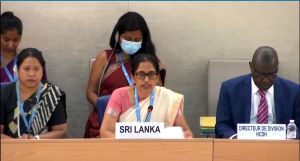
Mr. President
Excellencies
Distinguished Delegates
It gives me great pleasure to present to you the final position of the Government of Sri Lanka on the recommendations received during the 4th cycle of our UPR Report.
The mechanism of the UPR marks the culmination of a long review process of the international human rights machinery. We value the fact that this mechanism provides an equal opportunity for all UN member States, without discrimination, to voluntarily share the progress made domestically to promote and protect human rights. This peer review process has contributed to reducing selectivity and politicization in our efforts to advance the cause of human rights. It enables constructive engagement on developments related to human rights with our international partners, national independent institutions, civil society, and the UN system.
In these challenging times, as we strive for a future filled with renewed hope, the advent of the Hajj festival this year is of extreme significance.
The sacred festival of Hajj, embodies values and fulfilment derived from engaging in humanitarian endeavours, seeking solutions for the impoverished, without the expectation of respite from one’s own difficulties. It is a testament of the spirit of selflessness and compassion.
Prophet Ibrahim, his son Prophet Ishmael, and Mother Hagar stand as timeless symbols of dedication and sacrifice. For centuries, they have been revered universally, with their sacrifices being a source of gratitude and admiration.
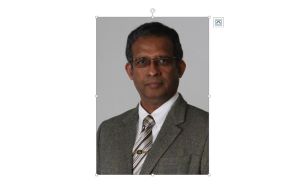
Sri Lanka’s candidate Ambassador Prasad Kariyawasam was elected to the UN Committee on the Protection of the Rights of All Migrant Workers and Members of Their Families at the election held on 27 June 2023 at the United Nations in New York.
Ambassador Kariyawasam is a retired career diplomat and has previously served in the Committee three times, during which he was also the Chairperson during the Committee’s initial formative stages.

Mr. President,
The Government of Sri Lanka is addressing the unprecedented social and economic issues arising from the economic crisis. Political stability has been restored while conditions on the ground have improved considerably for the people. In parallel and despite ongoing fiscal challenges, the Government is continuing its focus on the long-term measures towards reconciliation and accountability within the framework of the Constitution.
The GoSL has been successful in maintaining economic stabilization. The IMF Extended Fund Facility for Sri Lanka was approved recently, and the necessary fiscal, monetary and governance reforms are underway. Social protection measures to mitigate the impact on the poor and vulnerable have also been introduced. The availability of essential items including fertilizer, fuel, medicine and energy has been restored and headline inflation has decreased.

